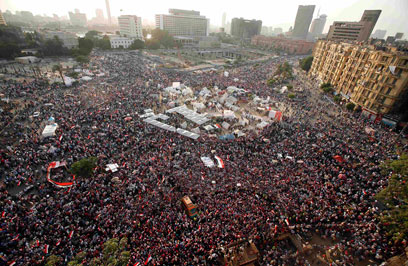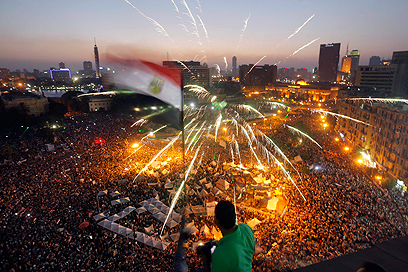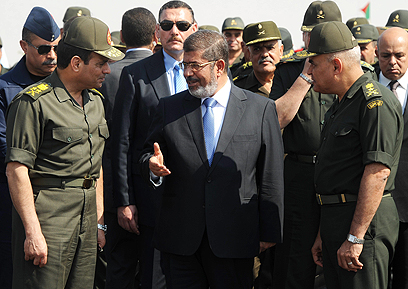
Egypt's Morsi meets army chief after ultimatum
President responds to military's ultimatum by meeting with general; 5 cabinet ministers resign. Millions of Egyptians protest demanding Morsi's removal; 'January 25 revolution is definitely coming back,' protester tells Ynet
Islamist President Mohamed Morsi met the head of Egypt's armed forces, along with the prime minister, on Monday, according to a statement on the president's official Facebook page. The page was updated after General Abdel Fattah al-Sisi issued a virtual ultimatum to Morsi to reach a power-sharing agreement with his political rivals within 48 hours.
Related stories:
The general had given politicians 48 hours on Monday to answer demands made by the Egyptian people, or the military would offer its own "road map for the future."
In a statement read on state television, the head of the country's armed forces referred to mass protests on Sunday, which called for Islamist President Mohamed Morsi to resign, calling them an "unprecedented" expression of the popular will.

Cairo's Tahrir Square (Photo: Reuters)
The army's ultimatum brought about a response from Egypt's second largest Islamist party, which said on Monday that it feared the army's return to public life. The Nour Party believes that Egypt's national security is threatened by the division between the ruling Islamists and their opponents, Khaled Alam Eddin, Morsi's advisor for environmental affairs who resigned on Monday, told the website of the Al-Ahram newspaper. "We have fears about a return of the army once again in the picture in a big way," he said.
But Egypt's main opposition bloc said on Monday that the army statement giving politicians 48 hours to compromise did not reflect a desire by the military to take power.
The ultimatum showed that the army respected the "principles of democracy and the will of the nation as a source of power," the National Salvation Front said in a statement. The group of liberals and leftists called on Egyptians to continue peaceful protests across the country.

Celebrating army's ultimatum to Morsi (Photo: AP)
But even as governmental maneuverings went on, organizers of the anti-government protests that brought millions of Egyptians into the streets this weekend gave Islamist President Mohammed Morsi until Tuesday afternoon to step down or else it would hike up its campaign, as protesters overran and ransacked the headquarters of Morsi's Muslim Brotherhood.
Resignation of ministers
In a sign of Morsi's growing isolation, five Cabinet ministers met Monday to consider resigning their posts and joining the protest movement, the state news agency said. The meeting gathered the communications, legal affairs, environment, tourism and water utilities ministers, MENA reported.
According to AFP, the ministers who chose to leave handed in their letters of resignation together to Prime Minister Hisham Kandil, the source said.

Protesters call for Morsi to resign (Photo: AP)
Sami Anan, military advisor to Egyptian President Mohamed Morsi, submitted his resignation in solidarity with the protesters against the Muslim Brotherhood.
Tourism minister Hisham Zazou had already tried to resign last month after Morsi appointed Adel al-Khayat, a member of an Islamist party linked to a massacre of tourists in Luxor, as governor of the temple city.

Tahrir Square (Photo: AP)
Morsi on June 16 named Khayat, along with 16 other new governors, including seven from his Muslim Brotherhood movement. Khayat is a member of the political arm of ex-Islamic militant group Gamaa Islamiya, which claimed responsibility for the massacre of 58 tourists at Luxor in 1997. Zazou had originally returned to work last week after Khayat quit.

al-Sisi, Morsi during better days (Photo: AP)
'Revolution is back'
On Monday, anti-Morsi protesters were gearing up for a second day of demonstrations.
Some protesters spent the night in dozens of tents pitched in the capital's central Tahrir Square and in front of the president's Ittihadiya Palace. They have vowed to stay there until Morsi resigns. The president's supporters, meanwhile, continued their sit-in in front of a major mosque in another part of Cairo.
The anti-Morsi demonstrators are calling for widespread labor strikes in an attempt to ratchet up the pressure on the president, but it was not immediately clear whether unions would respond to the call. Organizers are also calling for sit-ins at the Cabinet building, interim parliament, and another presidential place where Morsi has been working since late last week instead of Ittihadiya.
Among those in Tahrir Square was Mohamed Majdi Khanfi, 22, an editor of Israeli issues at the Egyptian opposition newspaper Al-Dostour told Ynet that the "January 25 revolution is definitely coming back."
The young journalist said that the most important thing in the army's announcement was that the army "stressed that it was at the side of the people and its will and not at the side of the president and the government, not even at the side of the opposition."
Khanfi commended the Egyptian army's involvement, saying that the military was interested in "defending the Egyptian people and end the mess that could drag the country into a civil war."
According to another Egyptian journalist, "the people had enough of the Muslim Brotherhood. The people want the army to be in charge until election."
The journalist, who spoke to Ynet anonymously, said that whatever the fate of his country will be, the Muslim Brotherhood must go. "They cause harm to the Egyptian people," he said. "They are fascists."
Muslim Brotherhood supporters also arrived at the square. Mahmoud, a student at the Ain Shams University in Cairo, told Ynet that "The Islamists must go down to the streets and show that the people are divided into those who support Morsi and those who oppose him. This will end in a referendum or a new government."
According to Mahmoud, if Morsi supporters do not take to the streets within the next 48 hours, it will be the end of Morsi and the Muslim Brotherhood. He added that he supported Morsi because he feared that if the president retired, a civil war might ensue.
AP, AFP, Reuters contributed to this report
- Receive Ynetnews updates directly to your desktop










